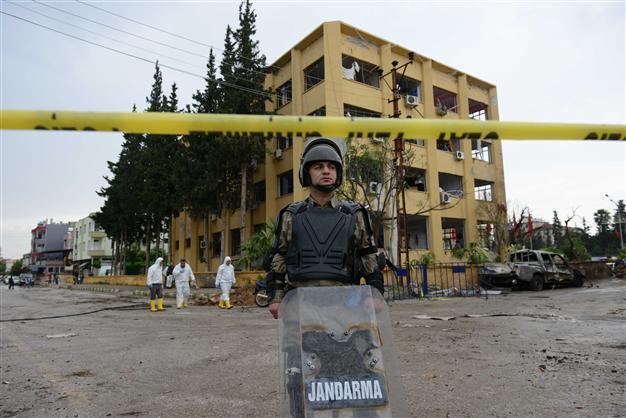9 Turkish citizens detained over Reyhanlı bombs, more wanted
HATAY

Daily News Photo, Emrah Gürel
Nine suspects, all Turkish citizens, have been detained over alleged connections to the Reyhanlı bombs on May 11 that killed 46 people, with officials still looking for a few more, according to Deputy Prime Minister Beşir Atalay.Accompanied by Justice Minister Sadullah Ergin, Interior Minister Muammer Güler and Health Minister Mehmet Müezzinoğlu, Atalay told members of the press that the nine suspects had been identified through their own confessions and statements.
Atalay also said 38 of the victims had been identified, three of which are Syrian citizens. “What is aimed at here is provocative sensation, an attempt to form negativity toward the refugees. Citizens must beware of that.”
Güler added that one of the nine suspects detained was the person who planned the incident and was involved in hiding the vehicle.
“Since yesterday, an atmosphere has been created as if other organizations had been claiming the act. It has nothing to do with the Syrian refugees or the Syrian opposition,” Güler said.
Over 732 workplaces, 62 vehicles, eight public buildings and 120 individual houses have been damaged by the explosions, Güler added, assuring citizens that the damage would be taken care of by state officials in the framework of the related laws.
Müezzinoğlu said 155 wounded have applied to hospitals, with 55 of them still receiving treatment. Seven of those are Syrian nationals, he added. Twenty-four people are still in critical condition, he said.
'No links with al-Qaeda'
In a later statement, Güler said that the attack did not appear to have any links to al-Qaeda, and also insisted that neither Syrian opposition nor refugees were involved in the attack. "The perpetrators are directly related to pro-Syrian regime organizations and were in contact with the [Syrian intelligence] Mukhabarat," he said.
Güler also added that the materials had been smuggled illegally from Syria, while the cars were bought in Turkey. "The bombs were loaded onto the cars in workshops. The culprits and their accomplices then took the cars to [Reyhanlı] and set them off," he said, adding that the bombs were detonated by remote control, according to initial examinations.
















